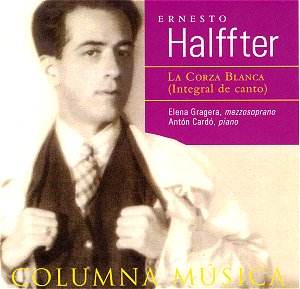It was with very great pleasure that I reviewed a few months ago two CDs by this team dedicated to Nín and Nín-Culmell, father and son. It was with equal pleasure that I remade acquaintance with Elena Gragera's warm, steady and even mezzo voice which, together with unfailing musicianship and a real sense of interpretation, presents this unfamiliar material in the most favourable of lights.
But I have to say that those wishing to extend their knowledge of Spanish song are recommended to buy the earlier discs first. It is fairly well-known that Ernesto Halffter was a protégé of Manuel de Falla whose early help he repaid by dedicating much of his later life to the completion of his master's vast work Atlantída . He also enjoyed a reputation as a conductor. Is he destined to remain forever under the shadow of de Falla or did he achieve a voice of his own?
Yes, up to a point, is the answer according to this disc. Like late de Falla, he seems to have gone through a phase of trying to sound, not exactly un-Spanish, but getting away from the easy melodic and rhythmic formulae that anyone can imitate. The trouble is that the baby appears to have gone out with the bathwater and his French cycle L'hiver de l'enfance (1928-1934) could have been written by practically any modestly talented Parisian of the day – sub-standard Roussel at his most doleful. This must have been a bad period for Halffter since the Canciones del niño de Cristal (1931-34), while finding him on home territory, are also somewhat unappealing. Rather disappointing after the fresh and attractive - and definitely Spanish – Dos Canciones of 1927 which open the disc. There seems no getting away from it – he's at his best when he's being thoroughly Spanish. Señora , of 1938, is in habanera tempo and is a lovely song, as is the Seguidilla Calesera , both imbued with the spirit of national dance rhythms. As a pianist myself I am always on the lookout for possible new repertoire for the singers I work with, and of the songs here, these are the two I would go for, plus maybe the fiercely exciting Canto Inca of 1944 and the charming Cançao do Berço of 1940-1 to complete the group with a slower one. The songs I have not mentioned are qualitatively between the two extremes, fairly attractive but not very inspiring. Pregón dates from as late as 1974 and at least shows that Halffter kept his mind sharp in his old age. Maybe later hearings will reveal more but – and bearing in mind that I have heard a few of his orchestral pieces, which sound too close to de Falla to merit an independent life – I have to say that Halffter seems a fairly marginal figure in Spanish music and perhaps it really is just that he is remembered above all for his work on Atlantída .
The sound is excellent and we get a useful presentation of the composer and the music, plus texts; all this is in Spanish and English. Three translators are named as responsible for the translations of the poems and only one of them has an English-sounding name. This is presumably why some are perfectly acceptable while others come out like this:
A little star of the morning
was changing from site
for seeing my girl
the place where she goes shelter
and the evening star
guakering, in setting on
do like a little lamp
for I could see her sleeping.
Would you believe it, my computer gives “guakering” as a mistake. How ignorant can Bill Gates and his entourage get? The original Spanish was “tremula” so I think , but I'm not placing any bets on it, that “guakering” was a brave stab at “quaking”. Not that the translation becomes much more intelligible either way.
Christopher Howell
